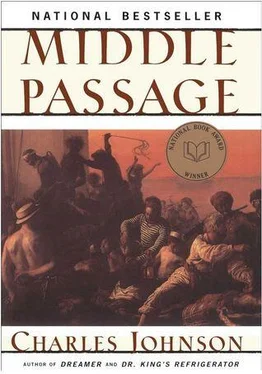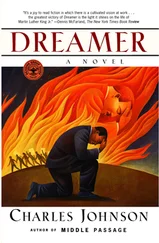Now. . yes, now I remembered those stories well. Falcon, the papers said, knew seven African coastal dialects and, in fact, could learn any new tongue in two weeks’ time. More, even, he’d proven it with Hottentot, and lived among their tribe for a month, plundering their most sacred religious shrines. He’d gone hunting for the source of the Nile, failed, but even his miscarried exploits made him raw material for myths spun in brandy and cavendish smoke in clubs along the eastern seaboard. He’d translated the Bardo Thodol— this, after stealing the only scroll from a remote temple in Tibet — and if the papers can be believed, he was a patriot whose burning passion was the manifest destiny of the United States to Americanize the entire planet. Really, I wanted to take off my hat in his presence, but I hadn’t worn one. Never mind that his sins were scarlet. He was living history. Of course, he stood only as high as my hips, and I had to fight the urge to pat him on his head, but I was, as I say, impressed.
“Sit,” said he, motioning to the chair at his chart table. “I don’t like people looking down at me.”
I could understand that; I sat.
Falcon toddled over to his washbasin, poured water from a bucket half his size, and began to sponge-bathe under his nightshirt, speaking over his left shoulder at me. “And, generally speaking, I don’t like Negroes either.”
“Sorry, sir.” He was frank; I liked that. With bigots a man knew where he stood. “But I can’t help that, sir.”
Falcon half-turned, his eyebrows lifting.
“I know you can’t, Calhoun. It’s one of the things I learned about Negroes after living with the Lotophagi on the African coast. You don’t think too well, or too often. I don’t blame you for stowing aboard.” He squeezed out his sponge. “Poor creature, you probably thought we were a riverboat, didn’t you?”
I fell back against the seat. “This isn’t a riverboat?”
“I thought so.” Falcon wet his hands, then finger-combed his hair, shook off the water, and carried his basin to the door, throwing it out on a man who began cursing like. . well, like a sailor until he saw the captain’s face, and meekly tipped his hat. Slamming the door, Falcon fixed me again with both eyes. “ ’Tis a slaver, Mr. Calhoun, and the cargo awaiting us at Bangalang is forty Allmuseri tribesmen, hides, prime ivory teeth, gold, and bullocks, which comes to a total caravan value of nearly nine thousand dollars, of which the officers and I have a profitable share — quite enough to let me retire after this run or finance an expedition I have in mind to Tortuga or, if I’ve a mind, see my share tripled at the gaming tables of Franscatis in Paris. But if you sail with us to Guinea — that is, if I don’t decide to nail your feet to the floor — it will have to be without pay. Do you see that, Calhoun?”
“Yessir.” I nodded. “Thank you, sir.”
“Good.” After toweling his hands, he took a shirt with frills down the front and a pair of pantaloons from a chest by the door. “I don’t hold it against you for being here. Or for being black, but I believe in excellence —an unfashionable thing these days, I know, what with headmasters giving illiterate Negroes degrees because they feel too guilty to fail them, then employers giving that same boy a place in the firm since he’s got the degree in hand and saying no will bring a gang of Abolitionists down on their necks. But no”—he looked pained—“not on my ship, Mr. Calhoun. Eighty percent of the crews on other ships, damn near anywhere in America, are incompetent, and all because everyone’s ready to lower standards of excellence to make up for slavery, or discrimination, and the problem. . the problem, Mr. Calhoun, is, I say, that most of these minorities aren’t ready for the titles of quartermaster or first mate precisely because discrimination denied them the training that makes for true excellence — ready to be mediocre mates, I’ll grant you that, or middlebrow functionaries, or run-of-the-mill employees, but not to advance the position, or make a lasting breakthrough of any kind. O, ’tis a scandal on the ships I’ve seen, and hardly the fault of the poor, half-trained Negro who hungers like anyone else these days for the glamour of titles and position.” He was grimly quiet for a second, lost in thought, and though it troubles me to tell you this, I almost saw his point, yet only for an instant, for what he said next was enough to straighten a sane man’s hair. “Now that I think of it, you remind me of a colored cabin boy named Fortunata who was aboard on my first trip to Madagascar.”
“He’s aboard now?”
“Hell, no. . Christ, no.” Falcon’s brows slammed together. “We ate him.”
Slowly I sat forward in my chair. “Sir?”
“Don’t look at me like that. I believe in Christian decency and doing right as much as the next man. I have a family, you know, in Virginia, and the man-eating savages I’ve seen, who make it a practice, disgust me. But there’s not a civilized law that holds water”—Falcon’s smile flickered briefly—“once you’ve put to sea.” He held the slow, hurt, sidelong look he’d given me, then began finger-stuffing his nightshirt into breeches that might have been tailored for a child. “We ran into a Spanish galleon and sank her, thank God — we’d have swung for smuggling if we hadn’t — but she left us damaged and with half the crew dead. The foremast was gone, the main yard sprung, and our rigging hung in elflocks. ’Twas an awful fight, I tell you, and we drifted for days without food or fresh water.” Falcon squirreled closer to me, his eyes brighter, wilder than I had yet seen them. “The sea does things to your head, Calhoun, terrible unravelings of belief that aren’t in a cultured man’s metaphysic. We ate tallow first, then sawdust, stopped up our noses and slurped foul water from the pumps before barbecuing that Negro boy.” Falcon added — sadly, I thought, “He was freshly dead, of course, crushed by a falling mast. He tasted. . stringy.”
Shivering, I rubbed my arms, wondering if just maybe the crew list for this voyage and the menu might be the same thing for this man. “I’m sorry.”
“So was I.”
It was silent then, Captain Falcon peering back into his memory of deep-sea cannibalism, a faintly bitter smile twisting his lips and jaw to one side, and I saw something — or thought I did — of myself in him and hated that. Cannibalism at sea was common enough, I knew, but he enjoyed telling this tale — enjoyed, as I did, any experience that disrupted the fragile, artificial pattern of life on land. Once at home, I realized, he would probably boast of his “experiences” at sea, use them to pull rank on those more timid and less vital than himself, interrupting a dinner with his wife’s parson — some psalm-singing milquetoast — to say, “I’ve no taste for chicken dumplings tonight after eating cabin boy, dear,” and they would be forced to look at him in both horror and fascination; yes, this above all else did Captain Falcon and his species of world conquerors thrive upon: the desire to be fascinating objects in the eyes of others.
Even then, as he quietly reflected and paced, tapping the end of his nose, he sneaked a look at me to see with how much reverence or revulsion — it didn’t matter either way since both fed the ego — I regarded him. More of the latter, I daresay, but for a man like this — who was so full of himself that he could not speak slowly or without collapsing one sentence into another, the words spilling out in a rush of brilliant confusion — for an American empire builder even my revulsion was enough to make him feel singular, special, unique.
Читать дальше












